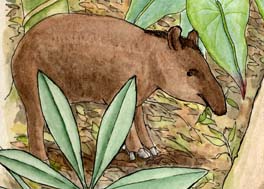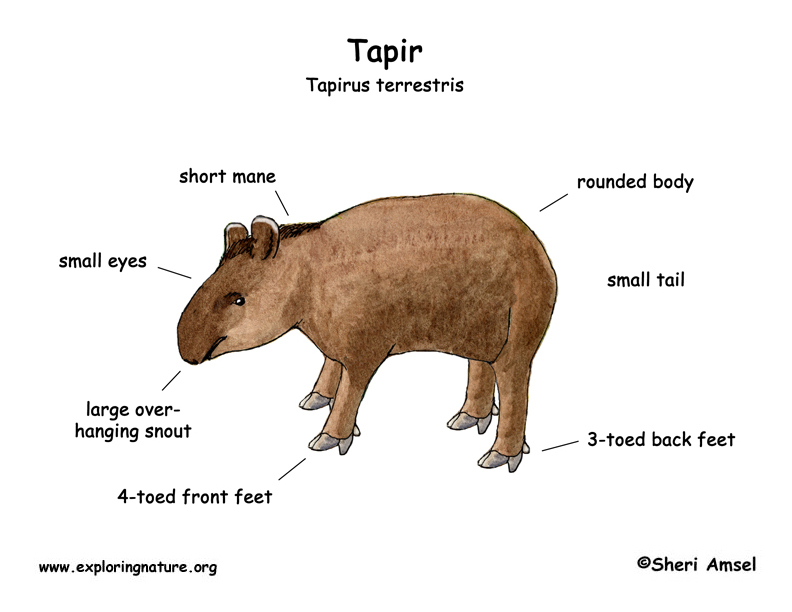

There are 4 species of Tapir. Brazilian (Lowland) tapir, Baird's tapir and mountain tapir are found from southern Mexico down to Brazil, and the Malayan tapir on the island of Sumatra, the Malay Peninsula, and Southern Thailand.
They live in dense rain forests, in river basins or near swamps and rivers.
Males weigh up to 750 pounds. Females are larger and weigh up to 900 pounds. Their large size allows them to go through dense brush when running from predators. They have small eyes and a long, pointed snout.
They are excellent swimmers and actually can dive into water and stay under for several minutes to escape predators. They are active at night (nocturnal).
They eat grass, water plants, and the leaves, buds, and fruit of shrubs. They live alone except to mate or mothers with young.
Predators include jaguars, crocodiles, and man.
Tapirs breed anytime throughout the year. Females are pregnant for about 13 months (gestation) and have 1 young. They breed every 1.5 years.
Tapirs can live for 30 years in the wild. The mountain tapir are listed as endangered. The Brazilian tapir are listed as endangered. Baird's tapir are listed as endangered. The Malayan tapir is listed as vulnerable on the CITES List (International List) and endangered on the U.S. Federal Endangered Species List.
Mountain Tapir -
Kingdom: Animalia
Phylum: Chordata
Subphylum: Vertebrata
Class: Mammalia
Order: Perissodactyla
Family: Tapiridae
Genus: Tapirus
Species: Tapirus pinchaque
Brazilian Tapir-
Kingdom: Animalia
Phylum: Chordata
Subphylum: Vertebrata
Class: Mammalia
Order: Perissodactyla
Family: Tapiridae
Genus: Tapirus
Species: Tapirus terrestris
Baird's Tapir-
Kingdom: Animalia
Phylum: Chordata
Subphylum: Vertebrata
Class: Mammalia
Order: Perissodactyla
Family: Tapiridae
Genus: Tapirus
Species: Tapirus bairdii
Malayan Tapir-
Kingdom: Animalia
Phylum: Chordata
Subphylum: Vertebrata
Class: Mammalia
Order: Perissodactyla
Family: Tapiridae
Genus: Tapirus
Species: Tapirus indicus
When you research information you must cite the reference. Citing for websites is different from citing from books, magazines and periodicals. The style of citing shown here is from the MLA Style Citations (Modern Language Association).
When citing a WEBSITE the general format is as follows.
Author Last Name, First Name(s). "Title: Subtitle of Part of Web Page, if appropriate." Title: Subtitle: Section of Page if appropriate. Sponsoring/Publishing Agency, If Given. Additional significant descriptive information. Date of Electronic Publication or other Date, such as Last Updated. Day Month Year of access < URL >.
Amsel, Sheri. "Tapir (Mountain, Baird's, Brazilian, Malayan)" Exploring Nature Educational Resource ©2005-2024. December 13, 2024
< http://exploringnature.org/db/view/380 >


